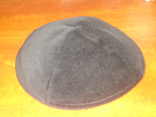In I got It!
What does this kippa mean to you?
Some say kippa and others call it yarmulke.
One of the identifying features of a religious Jew is his kippa, which proclaims its wearer as one who fears Heaven. Indeed, the very word itself hints to its purpose – its letters ‘chaf, phey’ are the same as those at the root of the word ‘kfifa’, ‘submission’.
This is in fact the purpose of the kippa - to cover the head, to teach submission to and awe of the One above.
Another term used to refer to the kippa is ‘yarmulke’. Since Yiddish translates ‘kippa’ as ‘yarmulke’, one might be led to believe that yarmulke is a genuinely Yiddish word - but this is incorrect. In fact, the word ‘yarmulke’ is actually of Aramaic origin, and is derived from the two words ‘yirei malka’ (fear of the King).
Despite all this, the kippa is not an exclusively Jewish symbol. Religious muslims also wear such a headdress, as do christians in the upper echelons of their clergy.
So, the kippa isn’t always a sign of such great holiness…







